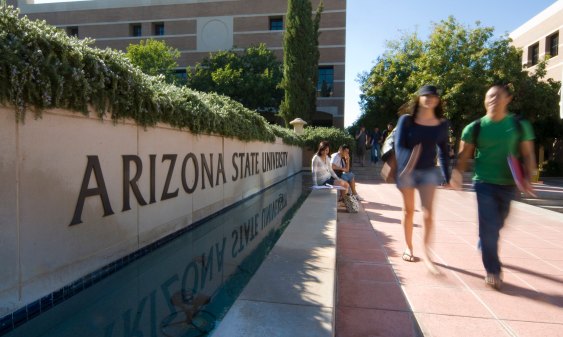Arizona State U. to launch digital learning record ‘Pocket’ in 2022

Arizona State University plans to launch a new app, called Pocket, as a decentralized digital student record beginning in Spring 2022, with goals to create a network nationwide of participating institutions.
The university showcased the new technology, backed by blockchain, during ASU’s Digital Trust Summit in June. Digital learning records that are decentralized through platforms like Pocket are designed to give students more control over their data.
The app also provides students with digital credentials; instead of working through multiple university student information systems to gather learning records and other information, students can approve participating institutions feeding information into the app.
In addition to course credits, course descriptions and grades, students will also be able to store a portfolio of work submitted for courses, skills endorsements and internships.
“The transcript is still the benchmark of learning, and the resume is still the benchmark for work, but both mechanisms fall short in representing an individual and their abilities,” Timothy Summers, ASU’s executive director of digital trust initiatives, said during a presentation during the summit.
The app could also help transfer students looking to keep track for course information and what credits transfer between institutions. For example, a student attending a community college could enable course data to feed into Pocket before enrolling at a four-year university. The app would notify the student of which courses transfer and provide a digital copy of the earned associate’s degree within the app.
A lifelong record
ASU already offers MyPath2ASU, an online course mapping tool for transfer students that allows them to save pathways to earning a degree and checklists of courses to take. But Pocket is meant to be more than a record of the path to graduation; Summers said it’s designed to continually store users’ student information throughout their lives.
The U.S. Department of Education earlier this month advised creating these kinds of records in its latest recommendations for higher education institutions on how to recover from the coronavirus pandemic. The guidance noted that digital records kept by students, rather than institutions, allows for easier re-enrollment and transfer.
“This ecosystem should be designed around the student with the goal of empowering them with ownership over their digital data and learning records, and control over how and with whom they are shared,” the guidance read. “Records should be published in a format that facilitates interoperability and the translation of a student’s skills, competencies, and knowledge across different educational and workforce institutions.”
Pocket is designed so that students can easily use credentials — scanning a QR code to prove they’re an ASU student, for instance — but also so employers can better match students with jobs and check credentials.
‘Go out there and start working’
Other institutions, like the private East Coast Polytechnic Institute University, are issuing diplomas backed by blockchain, along with URLs that can be included on resumes or social media profiles.
ASU is also part of the Open Skills Network, a group of companies, universities and nonprofits exploring ways to approach documenting student achievement. Instead of focusing on credit hours, OSN member institutions want to look at establishing a set of standardized skills between higher education and employers. The group is also coordinating a list of pilot projects, including other virtual wallet systems.
Western Governor’s University, an online institution that focuses on competency-based education, is also working on a virtual wallet system — with IBM, the National Student Clearinghouse, Goodwill of Central and Southern Indiana, and the workforce initiative Skillful Indiana — focused on competencies backed by university coursework and employment.
“Imagine having your own profile of all the things that you’ve accomplished in your professional life, not only your degrees, that you’ve acquired the university, but also, as you go through those degrees, what do they really mean for you, as an individual [when you] go out there and start working for a company,” WGU Chief Information Officer David Morales told EdScoop.




